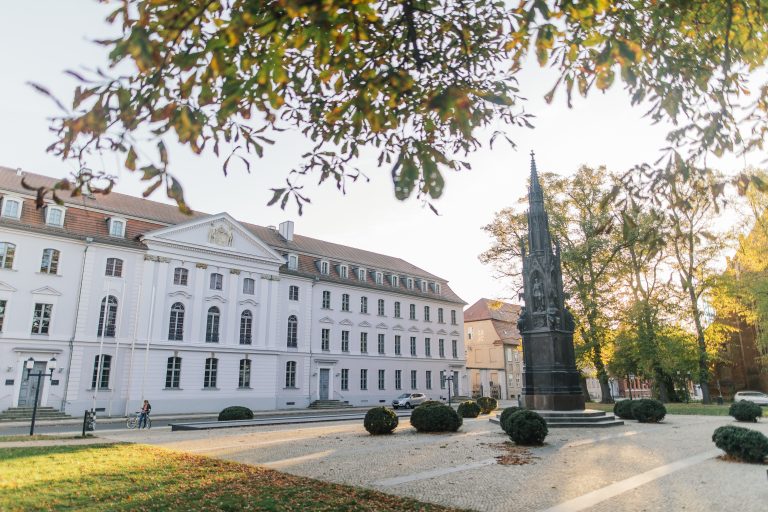The IKEM Annual Conference was held in Greifswald this year, a testament to the significance of the long-running collaboration between the institute and the University of Greifswald. In honour of the event, we’re taking a closer look at the history of this collaboration and the benefits it provides for research at both organisations.
In 2004, the University of Greifswald held its first Summer Academy, a multi-day programme initiated by Dr Michael Rodi to cultivate interdisciplinary dialogue on climate change. The Academy received an enthusiastic response from climate researchers eager to discuss the topic with colleagues from around the world. It demonstrated the need for greater cross-disciplinary collaboration around climate change – and ultimately led to IKEM’s founding.
‘The international angle of the Summer Academy was unique,’ said Anika Nicolaas Ponder, who has coordinated the conference – now an annual event called IKEM Academy – for 11 years. ‘The programme offered a global exchange on climate change at a time when such opportunities were still relatively rare.’
Rodi, who had assumed his position as chair of the university’s Faculty of Law and Economics in 1999, saw an opportunity to create a more permanent forum for international, interdisciplinary collaboration on climate change. He presented the University Senate with plans for an institute that would bridge the traditional boundaries between disciplines by exploring issues at the intersection of environmental law and financial law. The Senate approved the plans, and in 2009, Rodi founded IKEM with the help of Professor Christian Held and Dr Friedrich Hagemeyer. ‘I’m very grateful to the university, Professor Held and Dr Hagemeyer for their support with this project,’ said Rodi.
IKEM and the university created a cooperation agreement formalising the conditions of the partnership, such as shared access to research facilities, explained Jonathan Metz, who has headed the IKEM office in Greifswald since early 2021. ‘Today, there’s overlap between IKEM and the university at multiple levels,’ he said, ‘from personnel to programming.’ As part of the Netz-Stabil project, for example, IKEM worked with university researchers to evaluate approaches to grid stabilisation in the state of Mecklenburg-West Pomerania, where the university is located.
The collaboration between the institute and the university offers important advantages for each institution. For example, the university provides a measure of financial stability for IKEM – a valuable asset in light of the often-stiff competition for research funding. IKEM, in turn, offers greater flexibility in project selection and fewer bureaucratic hurdles, both of which are significant strategic advantages for research in a rapidly evolving field.
Simon Schäfer-Stradowsky, who has served as IKEM’s managing director since 2014, recognises the benefits of the exchange. ‘As an NGO, IKEM enjoys a certain degree of financial independence and gives the university a foothold in civil society and a more international orientation,’ he said. ‘In exchange, the university provides other benefits for IKEM, such as a solid academic foundation, opportunities to collaborate with excellent researchers and scientists, and essential infrastructure, like IT support and communications technology.’
The university’s location in the north-eastern state of Mecklenburg-West Pomerania also provides certain advantages. The surrounding area offers a useful window into Germany’s energy past and present: nearby energy infrastructure includes the (now defunct) Lubmin nuclear power plant as well as many of the on- and offshore wind parks that have established the country as a frontrunner in the energy transition. This benefits IKEM’s work: the IKEM Academy agenda includes site visits to these facilities, giving participants an up-close look at existing energy technology. In addition, the infrastructure informs the research on regional energy transitions conducted at Greifswald’s Interdisciplinary Centre for Baltic Sea Region Research (IFZO). Rodi, who heads the Energy Cluster, works at the centre with a team of post-doctoral students, who also contribute to IKEM projects.
IKEM’s office in Berlin supplements the benefits of the university’s Greifswald location. With greater proximity to key players in the capital city, for example, IKEM is better positioned to cultivate partnerships with the ministries, industry leaders, civil society organisations, and research institutions in the capital city.
Berlin is also a hub for energy transition research, which attracts world-class talent to the city and expands the pool of highly qualified candidates for IKEM positions. These employees contribute their expertise to projects at both the institute and the university – which Rodi views as a key benefit of the partnership. ‘IKEM enriches the climate expertise of Mecklenburg West-Pomerania,’ he said. ‘And collaboration with the university benefits IKEM by underscoring its academic orientation.’
The two institutions hope to strengthen their partnership in the coming years, even as Rodi steps back from his long-time post at the university to assume a more hands-on role at IKEM. Current plans include the creation of a climate research focus at the university that would integrate IKEM and other institutions into a collaborative research network.
‘We’re looking at the next years as a chance to build an even stronger connection with the university,’ said Schäfer-Stradowsky.
In this sense, IKEM’s decision to hold this year’s annual conference in Greifswald may be a harbinger of things to come. Metz sees this as a promising development. ‘Having the annual conference in Greifswald is a good first step towards greater collaboration,’ he said. ‘I hope it will open up even more opportunities for exchange.’


